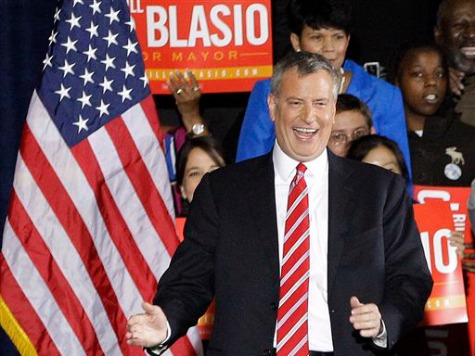On Tuesday, the electorate of New York City returned to the era of 1970s-style hard leftism in local government, electing Bill De Blasio mayor by a massive 45 point margin. De Blasio wasn’t the only hard-core leftist elected – he was accompanied on his road to victory by Comptroller-elect Scott Stringer and Public Advocate-elect Tish James, all of whom are class warfare advocates determined to place the higher burdens of governance on earners.
In his victory speech, De Blasio stated that inequality of income was his highest priority: “That inequality, that feeling of a few doing very well while so many slip further behind, that is the defining challenge of our times, because inequality in New York is not something that only threatens those that are struggling.” Mirroring the language of President Obama’s brand of progressivism, he stated, “The road ahead will be difficult, but it will be traveled. Progressive changes won’t happen overnight, but they will happen.” Not coincidentally, Obama called to congratulate De Blasio.
De Blasio became the first Democrat elected mayor since 1989; in 1993, Democrat David Dinkins was ousted by Rudy Giuliani. That was true despite the fact that Democratic registration outnumbers Republican registration in the city by a margin of 6 to 1.
De Blasio’s personal leftist history began with his support for the communist Sandanistas in Nicaragua, which left him with, according to The New York Times, “a vision of the possibilities of an unfettered leftist government.” De Blasio has called himself a fan of “democratic socialism,” and still praises the tyrannical Sandanistas as “trying to figure out what would work better.” He said he learned from the Sandanistas “how hands-on government has to be, how proactive, how connected to the people it must be.”
There is no question that De Blasio’s own brand of socialism mirrors that of his mentors in Nicaragua. His campaign website gives his take on the issues: “Nearly 400,000 millionaires call New York home, while nearly half of our neighbors live at or near the poverty line. Our middle class isn’t just shrinking; it’s in danger of vanishing altogether. Addressing the crisis of income inequality isn’t a small task. But if we are to thrive as a city, it must be at the very center of our vision for the next four years.” Virtually every issue on his website begins with the suggestion that inequality of economic outcome, not economic opportunity, is at the root of all evils in the city.
New Yorkers’ apparent shift to the left with regard to the mayoralty is less a result of a sudden leftward shift in their politics and more a result of the lack of a high-profile Republican candidate. After Giuliani’s successful terms as mayor, celebrity billionaire Michael Bloomberg took over, mirroring many of Giuliani’s law-and-order policies while infamously expanding government into the business of soft drinks and stairwells.
But Bloomberg has also overseen a dramatic slowing of the population increase in New York City, thanks largely to heavy regulation and high taxes. From 1974 to 1993, Democratic mayors Abraham D. Bearne, Ed Koch, and David Dinkins presided over a net loss of population in the city (the 1970 census showed New York’s population at 7.894 million, and the 1990 census showed it at 7.322 million); under Giuliani, population increased at a whopping rate (2000 census gave the population as 8.008 million), while slowing under Bloomberg (2010: 8.175 million). According to the Tax Foundation, New York State watched 3.4 million residents leave between 2000 and 2010, and population increase was due largely to immigration, leaving a net loss of $45.6 billion in income.
De Blasio’s policies will undoubtedly continue this trend, which means that New Yorkers may not be quite as unwilling to face fiscal realities as their election of him suggests. New Yorkers are default leftists who were burned by their own leftism in the 1970s and 1980s, and learned from that experience. But it’s been two decades since New Yorkers had the pleasure of experiencing disastrous Democratic rule, and so the electorate may have to learn all those lessons again the hard way. The good news is that when it comes to their city, New Yorkers have a tendency to stand up to those who pursue class warfare first rather than safety, security, and financial wellbeing of the city.
Ben Shapiro is Editor-At-Large of Breitbart News and author of the New York Times bestseller “Bullies: How the Left’s Culture of Fear and Intimidation Silences America” (Threshold Editions, January 8, 2013). He is also Editor-in-Chief of TruthRevolt.org. Follow Ben Shapiro on Twitter @benshapiro.

COMMENTS
Please let us know if you're having issues with commenting.